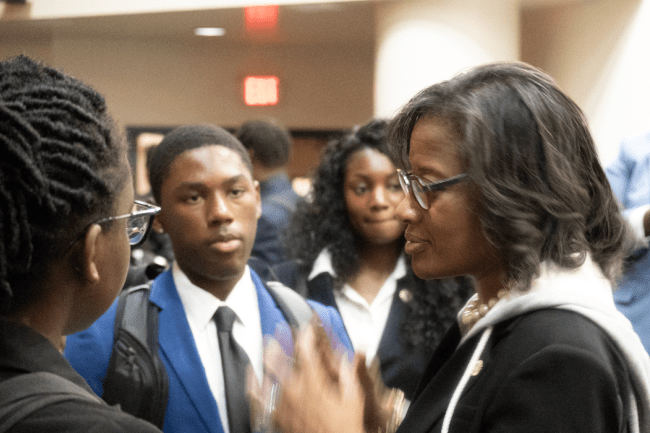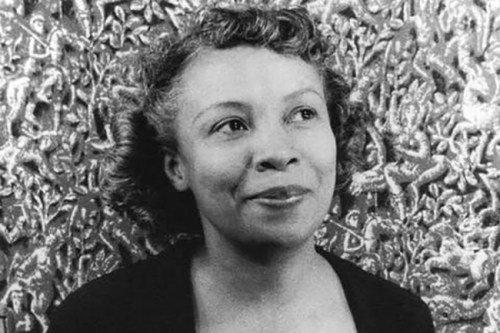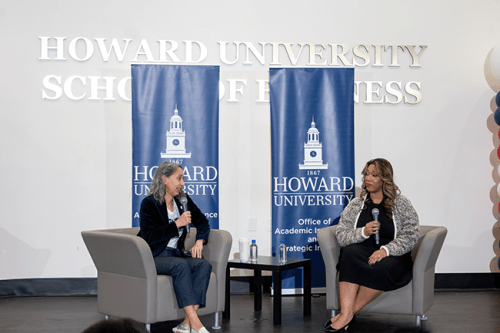On Wednesday, Oct. 8, Howard University Board of Trustees Chair, Leslie D. Hale (BBA ’94) addressed a packed audience of students in the School of Business to share her insights on leadership, strategy, and navigating today’s business landscape. Her opening drew the attention of the room as she reflected on the humbling moment she saw her portrait on the wall of the school’s entrance.
“When I came here, I had very simple ambitions. I sat in the same seat that you sit in today and my only ambition was to graduate and get a good job,” she began. “All I wanted was to get a job interview. So, to see my picture on the wall is not something I ever could have imagined when I came here as a student.”
To say that Hale surpassed her first goal as a first-year Howard student would be an understatement. She is the granddaughter of a sharecropper and was a self-described average student. However, she was raised by entrepreneurial parents in Los Angeles and today is nationally recognized as a pioneering business leader. She now serves as president and CEO at RLJ Lodging Trust, a leading hotel real estate investment trust that owns 96 hotels with approximately 21,200 rooms across the United States. Since joining RLJ in 2005, Hale has served the company as a visionary leader in progressively senior roles, including being appointed chief financial officer in 2007 and chief operating officer in 2016. She also successfully helped lead the execution of the company’s initial public offering in 2011 and serves on its board of directors.
Her 2018 promotion to CEO marked an important moment in the investment industry, as it made her the first African American woman to become chief executive of a publicly traded real estate investment trust, a testament to the School of Business’s legacy as the first step for singular leaders within the business world. Though she has achieved accomplishment after accomplishment in a career which has included leadership roles with Delta Airlines, GE, and Goldman Sachs, there’s one accomplishment she still holds highest— her Howard degree.
“My greatest accomplishment is actually graduating from Howard, because without Howard none of the other things would have been possible,” she said. “None of the other things would’ve even been on my radar because Howard is the place that opened up a world of possibilities for me. Howard is the place that overrode the low expectations that I had and really gave me the vision to be able to think boldly.”
Hale credits her time at Howard as the foundation for her inspiring career-- the place where she learned business fundamentals like how to give a strong handshake, where her love of numbers was nourished, and where she developed a gift for investments.
Hale implored the audience of business students to take advantage of this unique time in their lives and the unique place that is Howard.
When I think about my success and my path, I think about my faith, I think about my family, and I think about Howard University.
“Most importantly, it made me believe that I deserve to be in a room where decisions are being made,” she said. “Do not regret having not taken advantage of all it has to offer while you are here. When I think about my success and my path, I think about my faith, I think about my family, and I think about Howard University.”
Hale’s appreciation goes far beyond words. Since 2013, she has served on the University’s Board of Trustees, where she has chaired the Finance Committee, the Facilities and Real Estate Subcommittee, and the Investment Subcommittee, in addition to her current role as board chair. She has also served on the School of Divinity’s Board of Visitors and the Howard University Hospital Ad Hoc Committee of the Board.
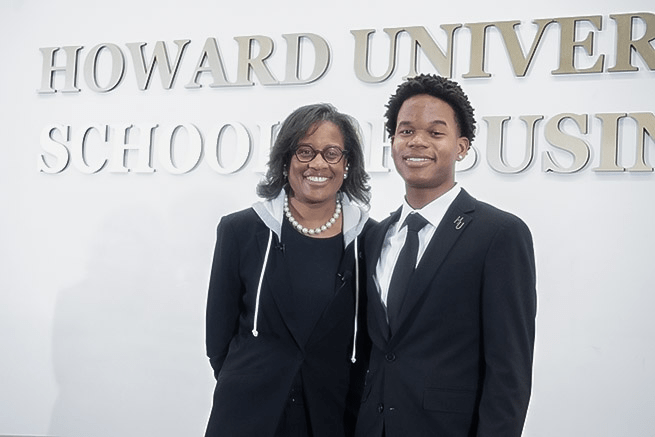
The Ingredients to Success
Instead of focusing on her resume during her presentation, Hale focused on the “ingredients” that have helped her excel throughout her career. Chief among those ingredients was hard work, she said, insisting that “hard work will outdo raw intelligence any day of the week.” Other ingredients include learning how to constantly “put yourself in situations where you can be not just successful but extraordinarily successful” and knowing the “rules of engagement,” the commonly understood but often unspoken rules for navigating corporate America.
Hale told the students that at this stage in their career, the most important thing is building out their toolkit, regardless of their field. Early in her own career, she focused on the “three Cs”— competency, confidence, and credibility — along with skills like writing skills, analytical skills, and persuasion skills.
“Whether you decide to go into the tech industry, finance, general management, the supply chain, whatever it is, you need to learn the language and what that space has to offer you,” she said.
Finding Mentors Through Standing Out
Hale also spoke of the importance of seeking mentors at all stages of your career, not just to open doors but also to learn fundamentals and to learn how to navigate the unofficial environments of business.
“I stand here today as a collection of a lot of people who invested in me,” she said. “No one gets where they are in their life by themselves. You have to have a network of individuals who lay the path for you as you move through your career.”
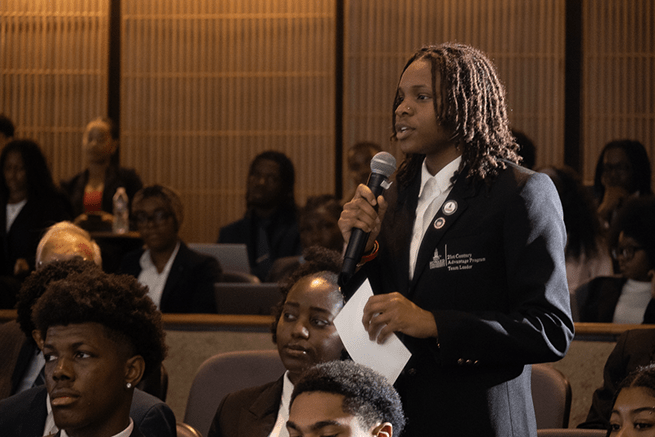
Her advice for finding mentors who will invest in you is surprisingly simple: do good work.
“When you do good work, when you’re a strong performer, mentors and sponsors will gravitate toward you,” she said. “And another important thing is to listen. When my mentors tell me to do something, I do it, and then I write to them and say ‘Hey, I did that thing that you asked me to do, and here was the outcome.’”
Those mentors can come at any time and from any walk of life, Hale emphasized. She relied on white male mentors who taught her technical skills in her early career, Black male mentors who helped her navigate the industry later in her career, and now as a leader herself, she looks to female mentors for advice on navigating work-life balance; for example, balancing being a mother or the only woman in a leadership space.
“Your mentors will evolve over time,” she said. “Some will become friends, or you’ll outgrow them, but you should always collect and expand your network, even at this level.”
Advice for the Next Generation of Business Leaders
The lecture ended with a fireside chat and Q&A, during which Hale and School of Business Dean Anthony D. Wilbon, Ph.D., (MBA ’90) discussed multiple topics, including imposter syndrome, navigating the hospitality industry in precarious economic times, and the role of diversity and inclusion. Asked for a final piece of advice for the next generation of executives in the room, Hale returned to the quality she emphasized at the start of her lecture: humility.
“We talked about confidence, but there’s a difference between being confident and humble and confident and arrogant,” she said. “When you have humility, you recognize that you still have a lot to learn.”
Again, she emphasized the simple but essential qualities of planning and putting in dedicated, hard work. She noted that a number of students tell her that they want to be a CEO. She encourages their long-term vision but then provides a good dose of reality.
“That’s great, but how about you learn how to do this Excel sheet first,” she said.
“I go back to the mindset of doing excellent work,” she continued. “It’s been said that as people of color, we don’t just have to do good work, we have to do excellent work — run faster, jump higher, and be the smartest person in the room. And that’s true. I don’t want to sugarcoat that, but when you do that, the opportunities will come to you. Mentors and sponsors will come to you. It starts with very basic things — do good work, a strong work ethic — and the opportunities will come, I promise you.”


